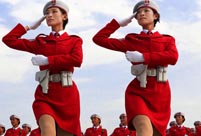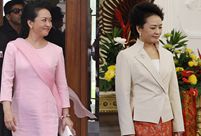 Bikini show in 2014 China Final of Miss Tourism World
Bikini show in 2014 China Final of Miss Tourism World
 Close-up view of August Aerobatic Team
Close-up view of August Aerobatic Team
 Goddesses married in 2014
Goddesses married in 2014
 Polar region photos raise worldwide awareness of global warming
Polar region photos raise worldwide awareness of global warming
 Get off at the last stop — Beijing Subway in vision
Get off at the last stop — Beijing Subway in vision
 Top 100 beauties in the world!
Top 100 beauties in the world!
 Gallery: Who is the most beautiful one?
Gallery: Who is the most beautiful one?
 If you like autumn, put your hands in the air!
If you like autumn, put your hands in the air!
 Fan Bingbing's "Queen style" in new play
Fan Bingbing's "Queen style" in new play
 Lingerie show at 2014 Miss China
Lingerie show at 2014 Miss China
Finance is the core of modern economy. In recent years, having shifted from economic and trade diplomacy to financial diplomacy, China is playing a more important role in the international financial order.
At the Beijing APEC meetings, China, the host, presented the "interconnection of Asia-Pacific" as one of the topics, which was warmly welcomed by leaders of participating countries and regions. Chinese president Xi Jinping has elaborated the "interconnection initiative" on multiple occasions to show our willingness to support building the infrastructure of relevant countries and sharing development opportunities, so as to achieve interactive Asian development.
The world has entered the post-financial crisis era with many uncertainties. Meanwhile, China's economy has entered the "new normal", and is engaged in a program of deeper reform and opening up. The "interconnection initiative" is based on the following principles:
China is on its way from being a major exporter of commodities to becoming a major exporter of capital. For a long time, capital was the scarcest resource in China's economic development. At the beginning of reform and opening up, attracting foreign capital was the most important target. More than 30 years of net capital inflow have been an important driving force of China’s economy. Since 2006, China's foreign exchange reserves have ranked first in the world. In 2013, China became the biggest goods trading nation. Presently, China has not only freed itself from the problems of capital and foreign exchange shortages, but has also actively invested in other counties. In the first three quarters of this year, outgoing FDI from Chinese enterprises reached 75 billion USD, a year-on-year growth of 21.6 percent. It is only a matter of time before China's outgoing FDI exceeds the FDI received. China will soon be a net capital exporting country, which means that China is entering a new era of foreign economic relations. China will gradually expand its influence in the global economy and play a bigger role in constructing the new international economic order.
At the same time, China is shifting from economic and trade diplomacy to financial diplomacy. Finance is the core of modern economics and a country will derive great benefit from leading the international financial order.
Take the US as an example: through paying in dollars, the US is able to buy commodities and resources from the rest of the world cheaply, and then it sells financial products to earn back the dollars it has spent. In recent years, having shifted from economic and trade diplomacy to financial diplomacy, China is playing a more important role in the international financial order. In 2014, three new institutions were established in rapid succession: the BRICS development Bank headquartered in Shanghai, the Asian Infrastructure Investment Bank headquartered in Beijing and the BRICS Contingency Reserve Arrangement. Meanwhile, China is actively promoting the establishment of the Shanghai Cooperation Organization Development Bank. China is carrying out financial diplomacy and transforming the international financial order with confidence. In the future, China will have a stronger power of financial discourse in Asia and among the emerging economies.
The "interconnection initiative" is a major strategy for China in this new era. It is about the long-term development of China and the prosperity and stability of the Asia-Pacific region. This initiative will facilitate the export of Chinese capital, industries, technologies and standards. During the process, countries of the Asia-Pacific region will complement each other's strengths, share the success of China's economic development, and rebuild the international economic order.
The article is edited and translated from《“互聯互通”開創金融外交新時代》, source: Economic Daily, author: Kang Ke.
 Beautiful Chinese woman
Beautiful Chinese woman 20 years on: Relocated Three Gorges residents through lens
20 years on: Relocated Three Gorges residents through lens PLA HK Garrison veterans leave behind beautiful smiles
PLA HK Garrison veterans leave behind beautiful smiles Chestnut girl goes viral online
Chestnut girl goes viral online Representative beauties
Representative beauties Victoria's Secret Fashion Show
Victoria's Secret Fashion Show Excellent photos of Zhuhai Air Show
Excellent photos of Zhuhai Air Show In photos: Bright and brave female soldier of PLA
In photos: Bright and brave female soldier of PLA China's charming first lady
China's charming first lady Disrespecting memorial days crosses a line
Disrespecting memorial days crosses a line More efforts needed in ITA talks: experts
More efforts needed in ITA talks: experts China’s burgeoning pageant industry a mess
China’s burgeoning pageant industry a mess South Korean educator brings positivity campaign to China’s Internet
South Korean educator brings positivity campaign to China’s InternetDay|Week|Month